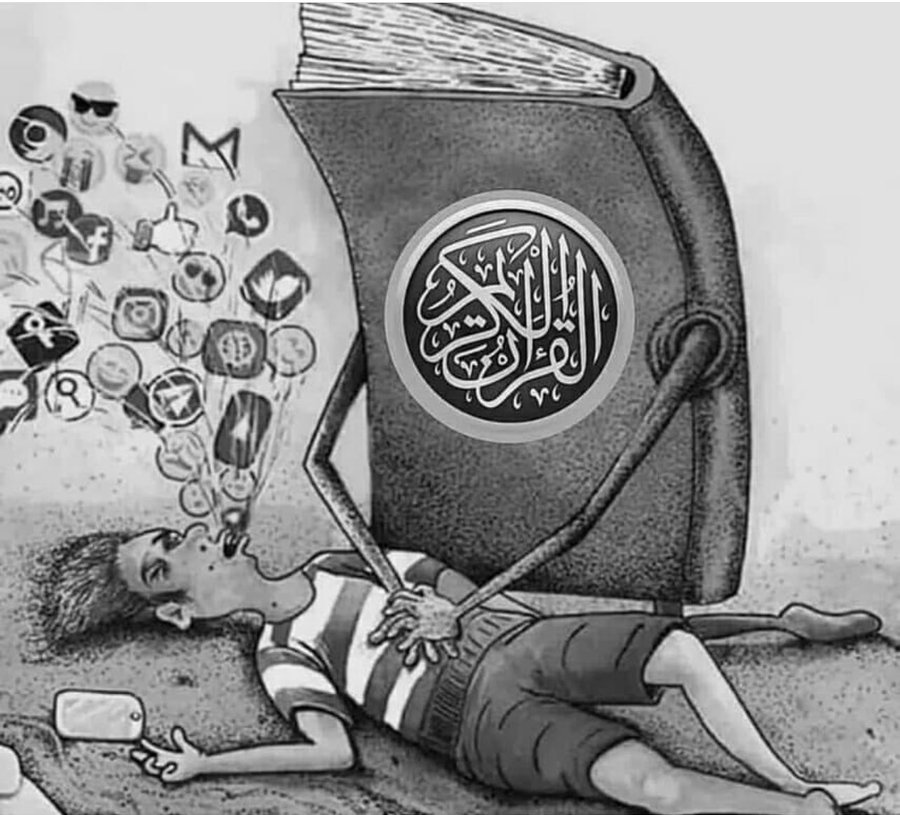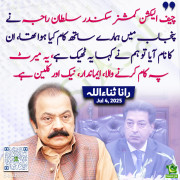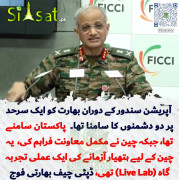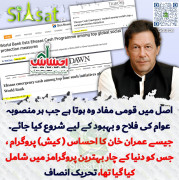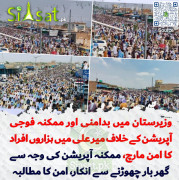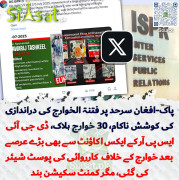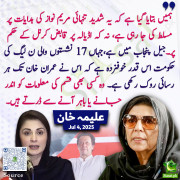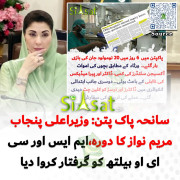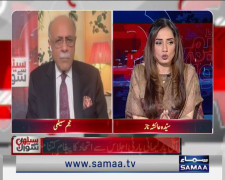Islamic guidelines for marital relationships among Muslims are not binding on non-Muslims.A question, Can a non-Muslim woman in a Muslim country be allowed to marry right after her husband's death?
You are using an out of date browser. It may not display this or other websites correctly.
You should upgrade or use an alternative browser.
You should upgrade or use an alternative browser.
عدت میں نکاح، طاہر اشرفی کے لاہور ہائیکورٹ کے فیصلے پر اعتراضات
- Thread starter Kashif Rafiq
- Start date
Wake up Pak
(50k+ posts) بابائے فورم
Can a divorced or widowed Muslim woman marry after getting her blood or urine test done? By the way, I know the Quranic verses about it.Islamic guidelines for marital relationships among Muslims are not binding on non-Muslims.
Sohail Shuja
Chief Minister (5k+ posts)
It is a pity that we only proscribe one or the other so called "scientific reasoning" in defining the religious ordinates.Can a divorced or widowed Muslim woman marry after getting her blood or urine test done? By the way, I know the Quranic verses about it.
Iddah or iddat does not only have one facet of "pregnancy" alone. Iddah does also have sociological and a psychological aspect as well. The couple is provided enough time to rethink about their decision.
For the bereaved widow, one must ponder that why the iddat period is prolonged than divorce? Obviously, it has something to do with the psychological aspect of bereavement and loss of a life partner and also it provides ample time for the widow to manage her children (if any), get the share of the property and think about her future course of action in a stabilized state of mind.
Also, if only pregnancy was the underlying issue in the concept of iddat, then the women and men of the ages of Menopause or Andropause would've been excluded from any such requirement. Pls note that the women who are of elderly age are not required by Quran to follow the strict codes of Purdah but iddat period is mandatory on them as well.
Wake up Pak
(50k+ posts) بابائے فورم
Exactly, you have explained it well.It is a pity that we only proscribe one or the other so called "scientific reasoning" in defining the religious ordinates.
Iddah or iddat does not only have one facet of "pregnancy" alone. Iddah does also have another sociological and a psychological aspect as well. The couple is provided enough time to rethink about their decision.
For the bereaved widow, one must ponder that why the iddat period is prolonged than divorce? Obviously, it has something to do with the psychological aspect of bereavement and loss of a life partner and also it provides ample time for the widow to manage her children (if any), get the share of the property and think about her future course of action in a stabilized state of mind.
Also, if only pregnancy was the underlying issue in the concept of iddat, then the women and men of the ages of Menopause or Andropause would've been excluded from any such requirement.
arifkarim
Prime Minister (20k+ posts)
Yes. If she is not pregnant, she can marry. That's the idea behind iddat.Can a divorced or widowed Muslim woman marry after getting her blood or urine test done?
Bubber Shair
Chief Minister (5k+ posts)
شرعیت کا حکم تو صرف مسلمان کیلئے ہے مگر عورت اگر مسلمان سے نکاح کرنے کی خواہاں ہے تو مسلمان اسے ضرور بتا دے کہ تین ماہ تک وہ نکاح نہیں کرسکتا کیونکہ اسلامی شریعت میں یہی حکم ہے۔ عورت کو بے شک گناہ نہیں مگر مرد تو شریعت کو توڑ رہا ہوگاA question, Can a non-Muslim woman in a Muslim country be allowed to marry right after her husband's death?
arifkarim
Prime Minister (20k+ posts)
شریعت کا حکم ہے چوری، ملاوٹ، کرپشن، دو نمبری نہیں کرنیشرعیت کا حکم تو صرف مسلمان کیلئے ہے مگر عورت اگر مسلمان سے نکاح کرنے کی خواہاں ہے تو مسلمان اسے ضرور بتا دے کہ تین ماہ تک وہ نکاح نہیں کرسکتا کیونکہ اسلامی شریعت میں یہی حکم ہے۔ عورت کو بے شک گناہ نہیں مگر مرد تو شریعت کو توڑ رہا ہوگا
اس پر عمل کرتے نہیں۔ عدت پر عمل کرنا ہے
Bubber Shair
Chief Minister (5k+ posts)
لیکن آپ کا سوال یہ نہیں تھا کہ عدت کا حکم کس لئے ہے اور اس کے کیا فوائد ہیںExactly, you have explained it well.
آپ نے پوچھا تھا کہ مسلمان عورت کیلئے تین ماہ عدت ہے غیر مسلم عورت اگر مسلمان مرد سے شادی کرے تو کیا حکم ہے؟
میں نے اس کا جواب دیا ہے
Bubber Shair
Chief Minister (5k+ posts)
توبہ تو کرسکتا ہے
Last edited:
Bubber Shair
Chief Minister (5k+ posts)
میری نہیں قرآن کی بات ہے ہم سب اس پر عمل کرنے کے پابند ہیںمیں آپ کی بات سے اتفاق کرتا ہوں
Bubber Shair
Chief Minister (5k+ posts)
بشری بی بی کا حمل ٹیسٹ منفی تھا۔ اسلئے شادی ناجائز کیسے ہو گئی کھوتے پٹواری
یہ اچھی بھلی بات کرتے کرتے تمہارا دماغی توازن کیوں ادھر ادھر ہوجاتا ہے؟
بشری بیگم کا پندرہ سال سے اپنے خاوند سے کوی تعلق ہی نہیں تھا اور تو "کلئیر بلیو" لے کر اس کا حمل ٹیسٹ کروانے پنہچ گیا؟؟؟
بشری بیگم کا پندرہ سال سے اپنے خاوند سے کوی تعلق ہی نہیں تھا اور تو "کلئیر بلیو" لے کر اس کا حمل ٹیسٹ کروانے پنہچ گیا؟؟؟
Wake up Pak
(50k+ posts) بابائے فورم
I wanted to see if someone could come up with the other aspects of the divorce/iddat, rather than the usual understanding of it., and Sohail Shuja has explained it well.لیکن آپ کا سوال یہ نہیں تھا کہ عدت کا حکم کس لئے ہے اور اس کے کیا فوائد ہیں
آپ نے پوچھا تھا کہ مسلمان عورت کیلئے تین ماہ عدت ہے غیر مسلم عورت اگر مسلمان مرد سے شادی کرے تو کیا حکم ہے؟
میں نے اس کا جواب دیا ہے
أَعُوذُ بِاللَّهِ مِنَ الشَّيْطَانِ الرَّجِيمِ
بِسْمِ اللَّهِ الرَّحْمَنِ الرَّحِيم
يٰٓاَيُّهَا النَّبِيُّ اِذَا طَلَّقْتُمُ النِّسَاۗءَ فَطَلِّقُوْهُنَّ لِعِدَّتِهِنَّ وَاَحْصُواالْعِدَّةَ ۚ وَاتَّقُوا اللّٰهَ رَبَّكُمْ ۚ لَا تُخْرِجُوْهُنَّ مِنْۢ بُيُوْتِهِنَّ وَلَا يَخْرُجْنَ اِلَّآ اَنْ يَّاْتِيْنَ بِفَاحِشَةٍ مُّبَيِّنَةٍ ۭ وَتِلْكَ حُدُوْدُ اللّٰهِ ۭ وَمَنْ يَّتَعَدَّ حُدُوْدَ اللّٰهِ فَقَدْ ظَلَمَ نَفْسَهٗ ۭ لَا تَدْرِيْ لَعَلَّ اللّٰهَ يُحْدِثُ بَعْدَ ذٰلِكَ اَمْرًا
اے نبی ﷺ ، جب تم لوگ عورتوں کو طلاق دو تو انہیں ان کی عدت کے لیے (ان کی عدّت کے حِساب سے) طلاق دیا کرو۔ اور عدّت کے زمانے کا ٹھیک ٹھیک شمار کرو ، اور اللہ سے ڈرو جو تمہارا ربّ ہے۔ (زمانۂ عدَّ ت میں ) نہ تم انہیں ان کے گھروں سے نکالو ، اور نہ وہ خود نکلیں اِلاّ یہ کہ وہ کسی صریح برائی کی مرتکب ہوں۔ یہ اللہ کی مقرر کردہ حدیں ہیں۔ اور جو کوئی اللہ کی حدوں سے تجاوز کرے گا وہ اپنے اوپر خود ظلم کرے گا ۔ تم نہیں جانتے ، شاید اِس کے بعد اللہ (موافقت کی) کوئی صورت پیدا کر دے (۱)
فَاِذَا بَلَغْنَ اَجَلَهُنَّ فَاَمْسِكُوْهُنَّ بِمَعْرُوْفٍ اَوْ فَارِقُوْهُنَّ بِمَعْرُوْفٍ وَّاَشْهِدُوْا ذَوَيْ عَدْلٍ مِّنْكُمْ وَاَقِيْمُوا الشَّهَادَةَ لِلّٰهِ ۭ ذٰلِكُمْ يُوْعَظُ بِهٖ مَنْ كَانَ يُؤْمِنُ بِاللّٰهِ وَالْيَوْمِ الْاٰخِرِ ڛ وَمَنْ يَّتَّقِ اللّٰهَ يَجْعَلْ لَّهٗ مَخْرَجًا
پھر جب وہ اپنی (عدت کی ) مدت کے خاتمہ پر پہنچیں تو یا انہیں بھلے طریقے سے (اپنے نکاح میں ) روک رکھو یا بھلے طریقے پر اُن سے جُدا ہو جائو۔ اور دو ایسے آدمیوں کو گواہ بنا لو جو تم میں سے صاحبِ عدل ہوں۔ اور (اے گواہ بننے والو) گواہی ٹھیک ٹھیک اللہ کے لیے ادا کرو ۔ یہ باتیں ہیں جن کی تم لوگوں کو نصیحت کی جاتی ہے ، ہر اس شخص کو جو اللہ اورآخرت کے دن پر ایمان رکھتا ہو۔ جو کوئی اللہ سے ڈرتے ہوئے کام کرے گا اللہ اس کے لیے مشکلات سے نکلنے کا کوئی راستہ پیدا کردے گا۔(2)
وَاڿ يَىِٕسْنَ مِنَ الْمَحِيْضِ مِنْ نِّسَاۗىِٕكُمْ اِنِ ارْتَبْتُمْ فَعِدَّتُهُنَّ ثَلٰثَةُ اَشْهُرٍ ۙ وَّاڿ لَمْ يَحِضْنَ ۭ وَاُولَاتُ الْاَحْمَالِ اَجَلُهُنَّ اَنْ يَّضَعْنَ حَمْلَهُنَّ ۭ وَمَنْ يَّتَّقِ اللّٰهَ يَجْعَلْ لَّهٗ مِنْ اَمْرِهٖ يُسْرًا
اور تمہاری عورتوں میں سے جو حیض سے مایوس ہو چکی ہوں ان کے معاملہ میں اگر تم لوگوں کو کوئی شک لا حق ہے تو (تمہیں معلوم ہو کہ) اُن کی عدّت تین مہینے ہے، اور یہی حکم اُن (عورتوں) کا بھی ہے جنہیں ابھی حیض نہ آیا ہو۔ اور حاملہ عورتوں کی عدّت کی حد یہ ہے کہ ان کا وضِع حمل ہو جائے۔ جو شخص اللہ سے ڈرے اس کے معاملہ میں وہ سہولت پیدا کر دیتا ہے۔(4)
سورہ الطلاق
اگر حمل ظاہر ہو جائے تو ٹھیک ہے ، ورنہ 9 مہینے گزرنے کے بعد وہ مزید تین مہینے عدت گزارے ، پھر وہ کسی دوسرے شخص سے نکاح کے لیے حلال ہو گی۔
ابن عباس، قتادہ اور عکرمہ کہتے ہیں کہ جس عورت کو سال بھر حیض نہ آیا ہو اسکی عدت تین مہینے ہے ۔
طاؤس کہتے ہیں کہ جس عورت کو سال میں ایک مرتبہ حیض آئے اس کی عدت تین حیض ہے ۔ یہی رائے حضرت عثمانؓ، حضرت علیؓ، اور حضرت زیدؓ بن ثابت سے مروی ہے ۔
امام مالک کی روایت ہے کہ ایک صاحب حبان نامی تھے جنہوں نے اپنی بیوی کو ایسے زمانے میں طلاق دی جبکہ وہ بچے کو دودھ پلا رہی تھیں اور اس پر ایک سال گزر گیا مگر انہیں حیض نہ آیا۔ پھر وہ صاحب انتقال کر گئے ۔ مطلقہ بیوی نے وراثت کا دعویٰ کر دیا۔ حضرت عثمانؓ کے سامنے مقدمہ پیش ہوا۔ انہوں نے حضرت علیؓ اور حضرت زیدؓ بن ثابت سے مشورہ طلب کیا۔ دونوں بزرگوں کے مشورے سے حضرت عثمانؓ نے فیصلہ فرمایا کہ عورت وارث ہے ۔ دلیل یہ تھی کہ نہ وہ ان عورتوں میں سے ہے جو حیض سے مایوس ہو چکی ہیں اور نہ ان لڑکیوں میں سے ہے جن کو ابھی حیض نہیں آیا، لہٰذا وہ شوہر کے مرنے تک اپنے اس حیض پر تھی جو اسے پہلے آیا تھا اور اس کی عدت باقی تھی۔
حنفیہ کہتے ہیں کہ جس عورت کا حیض بند ہو گیا ہو، مگر اس کا بند ہونا سن ایام کی وجہ سے نہ ہو کہ آئندہ اس کے جاری ہونے کی امید نہ رہے ،اس کی عدت یا تو حیض ہی سے ہو گی اگر وہ آئندہ جاری ہو، یا پھر اس عمر کے لحاظ سے ہوگی جس میں عورتوں کو حیض آنا بند ہو جاتا ہے اور اس عمر کو پہنچنے کے بعد وہ تین مہینے عدت گزار کر نکاح سے آزاد ہو گی۔ یہی قول امام شافعیؓ، امام ثوری اور امام لیث کا ہے ۔ اور یہی مذہب حضرت علیؓ، حضرت عثمانؓ اور حضرت زیدؓ بن ثابت کا ہے ۔
امام مالک نے حضرت عمر اور حضرت عبداللہ بن عباس کے قول کو اختیار کیا ہے اور وہ یہ ہے کہ عورت پہلے 9 مہینے گزارے گی۔ اگر اس دوران میں حیض جاری نہ ہو تو پھر وہ تین مہینے اس عورت کی سی عدت گزارے گی جو حیض سے مایوس ہو چکی ہو۔ ابن القاسم نے امام مالک کے مسلک کی توضیح یہ کی ہے کہ 9 مہینے اس روز سے شمار ہوں گے جب آخری مرتبہ اس کا حیض ختم ہوا تھا نہ کہ اس روز سے جب اسے طلاق دی گئی۔ (یہ تمام تفصیلات احکام القرآن للجصاص اور بدائع الصنائع للکاسانی سے ماخوذ ہیں)۔
امام احمد بن حنبل کا مذہب یہ ہے کہ اگر کوئی عورت جس کی عدت حیض کے اعتبار سے شروع ہوئی تھی، عدت کے دوران میں آئسہ ہو جائے تو اسے حیض والی عورتوں کے بجائے آئسہ عورتوں والی عدت گزارنی ہوگی۔ اور اگر اس کو حیض آنا بند ہو جائے اور معلوم نہ ہو سکے کہ وہ کیوں بند ہو گیا ہے تو پہلے وہ حمل کے شبہ میں 9 مہینے گزارے گی اور پھر اسے تین مہینے عدت کے پورے کرنے ہوں گے ۔ اور اگر یہ معلوم ہو کہ حیض کیوں بند ہوا ہے ، مثلاً کوئی بیماری ہو یا دودھ پلا رہی ہو یا ایسا ہی کوئی اور سبب ہو تو وہ اس وقت تک عدت میں رہے گی جب تک یا تو حیض آنا شروع نہ ہو جائے اور عدت حیضوں کے لحاظ سے شمار ہو سکے ، یا پھر وہ آئسہ ہو جائے اور آئسہ عورتوں کی سی عدت گزار سکے (الانصاف)۔
Cyber_Security
Chief Minister (5k+ posts)
Adding to you well described arguments,It is a pity that we only proscribe one or the other so called "scientific reasoning" in defining the religious ordinates.
Iddah or iddat does not only have one facet of "pregnancy" alone. Iddah does also have sociological and a psychological aspect as well. The couple is provided enough time to rethink about their decision.
For the bereaved widow, one must ponder that why the iddat period is prolonged than divorce? Obviously, it has something to do with the psychological aspect of bereavement and loss of a life partner and also it provides ample time for the widow to manage her children (if any), get the share of the property and think about her future course of action in a stabilized state of mind.
Also, if only pregnancy was the underlying issue in the concept of iddat, then the women and men of the ages of Menopause or Andropause would've been excluded from any such requirement. Pls note that the women who are of elderly age are not required by Quran to follow the strict codes of Purdah but iddat period is mandatory on them as well.
In Islam, if a woman takes a divorce from her husband or he divorces her and the marriage was never consummated then there is No IDDAT. But if a woman is widowed and her marriage was never consummated then still she has to go through the IDDAT period.
It proves your point.
ihsanullah
Politcal Worker (100+ posts)
Good Ponit But These test are not 100% some time, So we have to follow ISLAM being a Muslimکیا جا سکتا ہے اگر حمل ٹیسٹ منفی آجائے
Cyber_Security
Chief Minister (5k+ posts)
By the way, Technology and advancement, in science have added some complications. And things are not as simple.
A widow can still get pregnant by her late husband even after 20 years of his death through artificial insemination of her late husband's frozen sperm.
A widow can still get pregnant by her late husband even after 20 years of his death through artificial insemination of her late husband's frozen sperm.
What if a widow gets married and goes through artificial insemination of her late husband's frozen sperm without telling her current husband. The new husband would never find out that he was not the real father (unless he goes through DNA testing)
Last edited:
arifkarim
Prime Minister (20k+ posts)
Does Quran / Hadith cover artificial insemination and DNA testing? jani1 Wake up Pak Citizen X atensariBy the way, Technology and advancement, in science have added some complications. And things are not as simple.
A widow can still get pregnant by her late husband even after 20 years of his death through artificial insemination of her late husband's frozen sperm.
What if a widow gets married and goes through artificial insemination of her late husband's frozen sperm without telling her current husband. The new husband would never find out that he was not the real father (unless he goes through DNA testing)
Wake up Pak
(50k+ posts) بابائے فورم
No, the Quran does not but, staying within the four walls of the Quranic laws, we can issue by laws to adapt to the changing technology.Does Quran / Hadith cover artificial insemination and DNA testing? jani1 Wake up Pak Citizen X atensari
jani1
Chief Minister (5k+ posts)
jani1
Chief Minister (5k+ posts)
© Copyrights 2008 - 2025 Siasat.pk - All Rights Reserved. Privacy Policy | Disclaimer|


